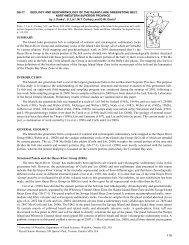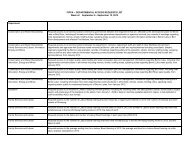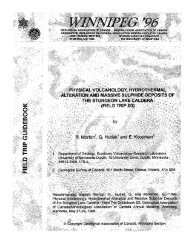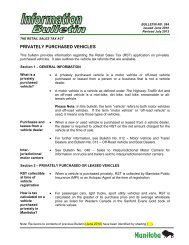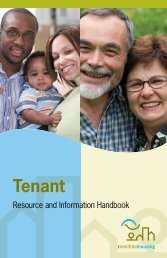HOMEWorks! A Housing Strategy and Policy Framework for Manitoba
HOMEWorks! A Housing Strategy and Policy Framework for Manitoba
HOMEWorks! A Housing Strategy and Policy Framework for Manitoba
Create successful ePaper yourself
Turn your PDF publications into a flip-book with our unique Google optimized e-Paper software.
A housing strategy<br />
<strong>and</strong> policy framework<br />
<strong>for</strong> <strong>Manitoba</strong><br />
1<br />
A housing strategy <strong>and</strong> policy framework <strong>for</strong> <strong>Manitoba</strong>.
Congregate Meal Program<br />
ublic <strong>Housing</strong><br />
Rental RRAP<br />
Rental an<br />
Sponsor Managed Public <strong>Housing</strong><br />
Congregate Meal Pro<br />
Urban Native Non-Profit <strong>Housing</strong> Program<br />
Co-operative <strong>Housing</strong> Program<br />
eowner RRAP<br />
Homebuyer Down Payment Assistance Program<br />
Congregate Meal Program<br />
Rural <strong>and</strong> Native <strong>Housing</strong><br />
Rent Assista<br />
creasing Supply of Af<strong>for</strong>dable <strong>Housing</strong><br />
Indexed Linked Mortgages<br />
RRAP<br />
Community Wellness Initiative<br />
A Roof Over<br />
mplementary Assistance Program Homeless Outreach Teams<br />
Homele<br />
Royalwood Community Wellness Initiative<br />
Homeowner RRAP<br />
Emergency Repair Program (ERP)<br />
Home Repair/Renovation Assistance Non-Profi<br />
L<strong>and</strong> Development<br />
d<br />
Congregate Meal Program<br />
Visitable <strong>Housing</strong> Design Asset<br />
ome Adaptations <strong>for</strong> Seniors’ Independence Program (HASI) Senior 55+ Hous<br />
UILDING Foundations Bursary Fund<br />
Bridgwater Forest<br />
Emergency Homeless Shelt<br />
Residential Rehabilitation Assistance Program (RRAP)<br />
Proposal Developm<br />
Needs<br />
Supporting Special Needs<br />
Aging in Plac<br />
Ownership Program<br />
Rental RRAP<br />
Royalwood U<br />
Af<strong>for</strong>dable <strong>Housing</strong><br />
Congregate Meal Program<br />
P<br />
Winnipeg <strong>Housing</strong> <strong>and</strong> Homelessness Initiative (WHH<br />
Increasing Supply of Af<strong>for</strong>dable <strong>Housing</strong><br />
Emergency Repair Program (ERP)<br />
lic <strong>Housing</strong><br />
Private Ownership <strong>and</strong> Rental - improving quality<br />
Sponsor Managed Public <strong>Housing</strong><br />
Urban Native Non-Profit <strong>Housing</strong> Program<br />
2<br />
A housing strategy <strong>and</strong> policy framework <strong>for</strong> <strong>Manitoba</strong>.<br />
Rental <strong>and</strong> Co<br />
Congregate Meal Program
A Message from the Minister of Family Services <strong>and</strong> <strong>Housing</strong>,<br />
Gord Mackintosh<br />
There are times when circumstances<br />
create great opportunity <strong>and</strong> this is one<br />
of those times. As <strong>Manitoba</strong> continues<br />
to hold steady in the global economy,<br />
housing provides solutions <strong>and</strong><br />
opportunities that will not only bolster<br />
our economy, but also support the wellbeing<br />
of all <strong>Manitoba</strong>ns.<br />
<strong>Manitoba</strong>’s Long-<br />
Term <strong>Housing</strong> <strong>Strategy</strong> <strong>and</strong> <strong>Policy</strong><br />
<strong>Framework</strong> is our long-term housing<br />
vision – supported by historic levels of<br />
government funding – that builds on a<br />
history of important housing initiatives.<br />
This investment supports not only people<br />
– especially those in need – but also jobs<br />
<strong>and</strong> training. Our investment builds<br />
the economy <strong>and</strong> continues to protect<br />
our provincially-owned existing social<br />
housing stock which is an essential public<br />
asset valued at more than $2.3 billion. It<br />
also increases af<strong>for</strong>dable housing options<br />
throughout the province.<br />
Access to safe, af<strong>for</strong>dable housing is key<br />
to reducing poverty.<br />
is a<br />
balanced, integrated approach to housing<br />
that supports provincial initiatives such<br />
as<br />
: <strong>Manitoba</strong>’s Poverty<br />
Reduction <strong>Strategy</strong>, Aging in Place<br />
<strong>Strategy</strong> <strong>and</strong> <strong>Manitoba</strong>’s Action <strong>Strategy</strong><br />
<strong>for</strong> Economic Growth. It will also help us<br />
achieve climate change goals <strong>and</strong> provide<br />
vital links to community <strong>and</strong> economic<br />
development.<br />
Gord Mackintosh<br />
Minister of Family Services <strong>and</strong> <strong>Housing</strong><br />
3
Shelter is a basic human need; housing provides a stable base to help individuals,<br />
communities <strong>and</strong> the economy thrive. Families <strong>and</strong> individuals who have good<br />
quality, stable, af<strong>for</strong>dable housing* have an improved quality of life. Good quality<br />
housing has a positive impact on the overall health of people <strong>and</strong> contributes to<br />
the safety of neighbourhoods. It also helps shape the identity of a community. The<br />
physical condition, location <strong>and</strong> availability of af<strong>for</strong>dable housing influences the<br />
development of communities <strong>and</strong> helps reduce poverty.<br />
<strong>Housing</strong> activity contributes to the<br />
provincial economy because construction<br />
promotes job skills training <strong>and</strong> creates<br />
jobs. Investing in housing:<br />
• stimulates economic activity in<br />
other sectors<br />
• increases consumer spending<br />
• improves investor confidence<br />
• encourages neighborhood revitalization<br />
• inspires communities to organize<br />
• advances community economic<br />
development<br />
<strong>Housing</strong> construction <strong>and</strong> renovation<br />
provide opportunities to address global<br />
warming <strong>and</strong> climate change issues. By<br />
working in partnership with private <strong>and</strong><br />
non-profit sectors, we can develop <strong>and</strong><br />
manage environmentally sustainable,<br />
af<strong>for</strong>dable housing in <strong>Manitoba</strong>.<br />
<strong>Housing</strong> is at the center of well-being. It<br />
affects physical <strong>and</strong> mental health <strong>and</strong><br />
influences an individual’s educational<br />
achievement, the ability to make healthy<br />
social connections <strong>and</strong> success in the job<br />
market. The ability to find <strong>and</strong> maintain<br />
employment provides income security <strong>and</strong><br />
helps individuals <strong>and</strong> families become more<br />
self-sufficient.<br />
<strong>Housing</strong> is also at the center of social, health<br />
<strong>and</strong> economic well-being <strong>and</strong> contributes to<br />
the development of sustainable communities.<br />
<strong>Housing</strong> is a crucial element <strong>and</strong> a key<br />
building block in assisting individuals,<br />
families <strong>and</strong> communities reach their full<br />
potential. <strong>Housing</strong> initiatives also support the<br />
development of community capacity. <strong>Housing</strong><br />
initiatives are successful when they help<br />
individuals <strong>and</strong> families achieve the highest<br />
possible level of independence <strong>and</strong> integration<br />
in the community.<br />
<strong>Housing</strong> is at the centre of well-being.<br />
4<br />
* See glossary <strong>for</strong> definitions of commonly used housing terms.
HEALTH CARE<br />
Improving physical <strong>and</strong><br />
mental health<br />
ECONOMIC<br />
DEVELOPMENT<br />
Investment <strong>and</strong><br />
job creation<br />
EDUCATION<br />
Enhancing educational<br />
attainment<br />
SOCIAL<br />
DEVELOPMENT<br />
Foundation of family<br />
life <strong>and</strong> social interaction<br />
HOUSING<br />
a stabilizing<br />
<strong>and</strong> facilitating<br />
role<br />
COMMUNITY<br />
DEVELOPMENT<br />
Skills development,<br />
investment, capacity<br />
building<br />
INCOME SECURITY<br />
Enhancing<br />
income security<br />
LABOUR FORCE<br />
Contributing to<br />
stability <strong>and</strong> mobility<br />
IMMIGRATION<br />
Facilitating integration<br />
<strong>Housing</strong> fits in the middle of<br />
everything. It is physical<br />
design; it is community<br />
economic development; it<br />
is social development; it is<br />
important to health <strong>and</strong><br />
educational outcomes; it<br />
can be a poverty reduction<br />
tool, <strong>and</strong> it is investment, a<br />
wealth creator <strong>and</strong> a<br />
generator of economic<br />
development. It is both an<br />
individual <strong>and</strong> public good.<br />
– Modified from Myers, D., (2008). Failed<br />
Urban <strong>Policy</strong>: Tear Down HUD. PLANET.<br />
July 2008<br />
<strong>Housing</strong> shapes communities.<br />
5
is <strong>Manitoba</strong>’s new housing<br />
strategy <strong>and</strong> policy framework. Our new<br />
vision <strong>and</strong> mission promote healthy<br />
people, stronger neighbourhoods, a green<br />
environment, <strong>and</strong> safety, quality <strong>and</strong><br />
af<strong>for</strong>dability in housing markets.<br />
OUR VISION<br />
Creating stronger communities<br />
through housing solutions<br />
OUR MISSION<br />
To provide housing leadership that<br />
contributes to the health, social <strong>and</strong><br />
economic well-being of all <strong>Manitoba</strong>ns<br />
The<br />
housing strategy <strong>and</strong><br />
policy framework is a new approach that<br />
balances the social, business <strong>and</strong> economic<br />
development objectives of housing. It<br />
integrates these objectives with areas<br />
such as health, economic development<br />
<strong>and</strong> the environment. This approach<br />
provides housing options that encourage<br />
<strong>Manitoba</strong>ns’ full participation in society<br />
<strong>and</strong> supports the province’s economic goals.<br />
promotes:<br />
• the economic <strong>and</strong> social independence of<br />
people, places <strong>and</strong> communities<br />
• accountability among governments,<br />
organizations <strong>and</strong> citizens<br />
• more housing options <strong>for</strong> <strong>Manitoba</strong>ns<br />
<strong>Manitoba</strong>’s housing strategy <strong>and</strong> policy<br />
framework provides a range of housing<br />
assistance that addresses housing<br />
af<strong>for</strong>dability, supply, services <strong>and</strong> supports.<br />
Households require a range of housing options to fit their needs.<br />
6
HOUSING CHALLENGES<br />
THE ROLE OF HOUSING IN PEOPLE’S LIVES<br />
Quality housing helps individuals <strong>and</strong> families develop their own personal<br />
resources <strong>and</strong> capabilities. This leads to positive results, including increased<br />
self-reliance in people’s lives.<br />
PHYSICAL<br />
Indoor environment<br />
Environmental issues<br />
Good condition<br />
Appropriate size <strong>and</strong><br />
design <strong>for</strong> household<br />
LOCATIONAL<br />
Safe <strong>and</strong> secure<br />
Access to transportation<br />
Access to services<br />
Neighbourhood<br />
HOUSING<br />
IN PEOPLE’S<br />
LIVES<br />
FINANCIAL<br />
Cost<br />
Af<strong>for</strong>dability<br />
Economic development<br />
Skills development<br />
Investment<br />
Assets<br />
PSYCHOLOGICAL<br />
Pride <strong>and</strong> status<br />
Security<br />
Family foundation<br />
Social support<br />
Social network<br />
Nostalgic affection<br />
Collective/cultural identity<br />
Four housing dimensions: physical,<br />
financial, locational, psychological.<br />
The physical dimension represents the<br />
environmental aspect of homes, including<br />
how the size <strong>and</strong> design meets individual<br />
<strong>and</strong> family needs.<br />
The financial aspect determines how much a<br />
family can af<strong>for</strong>d to spend on housing which is<br />
the largest expense most people have. Money<br />
not spent on housing can be spent on other<br />
necessities that can increase quality of life.<br />
The locational dimension refers to the fact<br />
that when people live in a neighbourhood<br />
where they feel safe <strong>and</strong> secure, they are<br />
more likely to actively participate in their<br />
community. This positively affects their<br />
social <strong>and</strong> economic well-being.<br />
The psychological dimension represents<br />
a place where people find refuge, rest,<br />
security <strong>and</strong> personal freedom.<br />
7
Markets<br />
Since 2000, housing has been one of the<br />
fastest growing sectors of the provincial<br />
economy, supported by high levels of new<br />
construction, renovation <strong>and</strong> sales of existing<br />
homes. The strength of <strong>Manitoba</strong>’s housing<br />
sector is due to our stable economy.<br />
Good economic conditions, developing<br />
industry <strong>and</strong> increased immigration have<br />
created a steady dem<strong>and</strong> <strong>for</strong> rental housing<br />
in <strong>Manitoba</strong>’s urban centres. In April 2009,<br />
Thompson had a vacancy rate of 0.2 per cent<br />
<strong>and</strong> Br<strong>and</strong>on’s vacancy rate was 0.1 per cent.<br />
The vacancy rate in Portage la Prairie was 1.2<br />
per cent <strong>and</strong> in Steinbach, it was 1.0 per cent.<br />
In the Winnipeg Census Metropolitan Area<br />
(CMA), the apartment vacancy rate in October<br />
2008 was 1.0 per cent <strong>and</strong> in April 2009, it was<br />
0.9 per cent. The rental market is considered<br />
balanced when the vacancy rate is 3.0 per cent.<br />
Winnipeg’s vacancy rate is expected to remain<br />
well below the balanced rate <strong>for</strong> some time.<br />
As of April 2009, there were 53,906 rental units<br />
in Winnipeg, 3,300 fewer units than in 1992.<br />
The tight rental market has resulted in an<br />
increase in the construction of rental housing.<br />
Since 2007, approximately 1500 units have<br />
been added to Winnipeg’s market through<br />
private <strong>and</strong> public investment. However,<br />
this increase is not enough to keep up with<br />
population growth <strong>and</strong> increased numbers<br />
of households. As a result, tight rental market<br />
conditions will continue.<br />
The decline in both social <strong>and</strong> rental-market<br />
housing keeps vacancy rates low. As a result,<br />
average rents in the province have increased<br />
more than the incomes of people living in<br />
poverty.<br />
2<br />
Private Apartment Vacancy Rates (%)<br />
<strong>Manitoba</strong> Centres<br />
10,000+<br />
%<br />
1<br />
0<br />
2006<br />
2007 2008 2009<br />
8<br />
Source: Canada Mortgage <strong>and</strong> <strong>Housing</strong> Corporation
Income <strong>and</strong> Core <strong>Housing</strong> Need<br />
Shelter is the greatest expense most people<br />
have; there<strong>for</strong>e, af<strong>for</strong>dable housing has a<br />
significant impact on personal well-being.<br />
The 2008 <strong>Manitoba</strong> Child <strong>and</strong> Family Poverty<br />
Report Card shows an increasing gap between<br />
the Employment <strong>and</strong> Income Assistance (EIA)<br />
amount allocated <strong>for</strong> shelter support <strong>and</strong><br />
recipients’ actual costs <strong>for</strong> shelter. This means<br />
families have to make difficult budget choices.<br />
The Canada Mortgage <strong>and</strong> <strong>Housing</strong><br />
Corporation (CMHC) reports that in 2009,<br />
the average rent <strong>for</strong> a one-bedroom apartment<br />
in <strong>Manitoba</strong>n’s urban centres was $610 per<br />
month. To stay within a 30 per cent shelter-toincome-ratio,<br />
a household would need to earn<br />
$24,400 annually – about $12.50 per hour. By<br />
comparison, a single person earning a fulltime<br />
minimum wage in <strong>Manitoba</strong> currently<br />
earns approximately $16, 575 annually.<br />
other benefits. This could leave families<br />
who need to rent in the private housing<br />
market with a $205 shortfall each month.<br />
For individuals who qualify, social housing<br />
makes up this shortfall by setting rental rates<br />
according to the shelter component <strong>for</strong> EIA<br />
recipients which provides a rental rate based<br />
on a 27 per cent rent-geared-to-income scale.<br />
Insufficient income levels affect a households’<br />
ability to access safe, suitable <strong>and</strong> adequate<br />
housing. Families or individuals who spend<br />
more than 30 per cent of their incomes<br />
on housing are considered to be in core<br />
housing need. In <strong>Manitoba</strong>, 11.3 per cent<br />
of households were in core housing need<br />
in 2006, down slightly from 11.6 per cent<br />
in 2001. There were a total of 46,900<br />
households in core need in <strong>Manitoba</strong> in<br />
2006.<br />
The <strong>Manitoba</strong> Child <strong>and</strong> Family Poverty Report<br />
Card indicates in 2008 a single parent with<br />
one child received a shelter allowance of $387<br />
per month. This is the basic EIA rate, without<br />
9
INCOME AND CORE HOUSING NEED<br />
Families who have to spend 30 per cent or<br />
more of their income on quality housing<br />
have less money to spend on other<br />
important things, including food <strong>and</strong><br />
transportation. This situation is heightened<br />
<strong>for</strong> families with children because they<br />
are more likely to face over-crowded or<br />
inadequate living conditions that create<br />
health <strong>and</strong> safety risks. This situation is<br />
often found in distressed neighbourhoods<br />
with poor quality housing.<br />
CMHC reports that people living alone or<br />
in single-parent families are much more<br />
likely to spend 30 per cent or more of<br />
household income on shelter. Women living<br />
alone or as a single parent are even more<br />
likely to be in core housing need <strong>and</strong> may<br />
also be living in poverty.<br />
Persons with disabilities, Aboriginal families<br />
<strong>and</strong> immigrants are at greater risk of being<br />
in core housing need.<br />
Likelihood of Being in Core <strong>Housing</strong> Need By Group<br />
<strong>Manitoba</strong><br />
Lone Parent<br />
Families<br />
28.5<br />
Immigrants*<br />
26.0<br />
Aboriginal Households<br />
22.4<br />
Persons with<br />
disabilities<br />
14.5<br />
Overall<br />
11.3<br />
0 5 10 15 20 25 30 35<br />
* During first five years of being a l<strong>and</strong>ed immigrant.<br />
Source: Canada Mortgage <strong>and</strong> <strong>Housing</strong> Corporation<br />
<strong>Housing</strong> supports poverty reduction.<br />
%<br />
10
GROUPS IN CORE HOUSING NEED<br />
• Single-parent families relying on one<br />
income are more likely to be in core<br />
housing need (28.5 per cent) than any<br />
other group. Aboriginal women are more<br />
likely to live in single-parent households<br />
than non-Aboriginal women. According<br />
to the 2008 <strong>Manitoba</strong> Child <strong>and</strong> Family<br />
Poverty Report Card, almost 40 per cent<br />
of children in single-parent families are<br />
living in poverty.<br />
• <strong>Manitoba</strong>’s Aboriginal population is the<br />
province’s fastest growing population<br />
segment. It is projected that Aboriginal<br />
people will represent 17 per cent of<br />
the province’s total population by<br />
2016 <strong>and</strong> one-quarter of Winnipeg’s<br />
work<strong>for</strong>ce by 2019. Aboriginal people<br />
have a high residential mobility rate that<br />
presents challenges to maximizing their<br />
opportunities in education, employment<br />
<strong>and</strong> health services.<br />
12,000<br />
• Statistics Canada data indicates that<br />
the number of adults <strong>and</strong> children with<br />
disabilities in <strong>Manitoba</strong> increased from<br />
14.2 per cent of the population in 2001,<br />
to 15.7 per cent in 2006.<br />
• Immigration to <strong>Manitoba</strong> is at its highest<br />
level in 50 years. Since 1999, over 60,500<br />
immigrants have arrived, increasing the<br />
need <strong>for</strong> housing in the province. As part<br />
of our immigration strategy, <strong>Manitoba</strong><br />
attracts many temporary <strong>for</strong>eign workers<br />
to help meet labour <strong>and</strong> skill shortages.<br />
In 2007, the number of these workers<br />
more than doubled, from 1,426 to 2,878<br />
over the previous four years. Providing<br />
sufficient housing <strong>for</strong> these temporary<br />
residents represents a unique challenge.<br />
<strong>Manitoba</strong> Immigration Levels<br />
2001–2007<br />
10,000<br />
8,000<br />
#<br />
6,000<br />
4,000<br />
2,000<br />
0<br />
1998<br />
1999 2000 2001 2002 2003 2004 2005 2006 2007<br />
11
People with Special <strong>Housing</strong> Needs<br />
• In 2006, 14 per cent of all <strong>Manitoba</strong>ns<br />
were over the age of 65. That number will<br />
increase to approximately 21.3 per cent by<br />
2026 as the baby boom generation ages.<br />
Although a higher proportion of seniors<br />
live in rural areas than cities, seniors in<br />
smaller communities have been moving to<br />
cities <strong>for</strong> health care <strong>and</strong> other services <strong>and</strong><br />
housing with support options. <strong>Manitoba</strong>’s<br />
seniors will increasingly dem<strong>and</strong> a range<br />
of af<strong>for</strong>dable housing options with various<br />
levels of services, especially in rural<br />
communities. <strong>Manitoba</strong>’s seniors have<br />
diverse cultural, economic <strong>and</strong> health<br />
care needs that must be addressed in our<br />
housing options.<br />
• Statistics Canada states that in 2006,<br />
15.7 per cent of adults <strong>and</strong> children in<br />
<strong>Manitoba</strong> had a disability. There were<br />
also more people with both mental health<br />
issues <strong>and</strong> other disabilities moving<br />
from institutions into the community.<br />
A variety of housing options are needed<br />
to assist persons with disabilities live<br />
successfully in the community.<br />
12
OUR PRIORITIES: People <strong>and</strong> Places<br />
<strong>Manitoba</strong> is building <strong>for</strong> the future with innovative thinking, renewed commitment,<br />
strong partnerships <strong>and</strong> a clear vision that makes housing a provincial priority.<br />
<strong>Housing</strong> is more than a physical place to live, it is a multi-dimensional part of<br />
people’s lives: a home, a place to raise a family, an investment <strong>and</strong> being part of a<br />
neighborhood <strong>and</strong> a community. The province has eight priority investment areas.<br />
1. The homeless <strong>and</strong> those needing<br />
intense services to promote their<br />
safety <strong>and</strong> well-being<br />
Many life circumstances may affect a person’s<br />
housing situation. Homelessness can affect<br />
people of any age <strong>and</strong> demographic group.<br />
Homelessness is characterized by extreme<br />
poverty, insufficient income, lack of social<br />
supports, poor health <strong>and</strong> heavy use of<br />
emergency services <strong>and</strong> a lack of adequate<br />
af<strong>for</strong>dable housing.<br />
Other circumstances such as family violence,<br />
addiction, mental health or physical disabilities<br />
also influence an individual’s or family’s ability<br />
to access adequate <strong>and</strong> suitable housing. Many<br />
low-income people in these circumstances<br />
need housing with support services to help<br />
them participate fully in their communities.<br />
There are also unique groups, such as youth<br />
who grow up without parental or social<br />
support,victims of family violence <strong>and</strong><br />
people released from jail who need housing<br />
options in the community. These groups<br />
also need access to support services to help<br />
them become self sufficient <strong>and</strong> increase<br />
their success in remaining connected to<br />
their communities.<br />
2. New Canadians<br />
Af<strong>for</strong>dable housing options <strong>for</strong> workers at<br />
all income levels will help promote local<br />
economic development.<br />
The settlement of l<strong>and</strong>ed immigrants <strong>and</strong><br />
refugees supports the province’s economic<br />
growth strategy. Immigrant families need<br />
af<strong>for</strong>dable housing options, generally in wellpopulated<br />
areas, that are suitable <strong>for</strong> their<br />
family size. These families may also require<br />
access to support services. Others families<br />
settle in rural communities, attracted by<br />
developing industries where there are low<br />
vacancy rates.<br />
3. First Nations <strong>and</strong> Métis<br />
High mobility rates, combined with a limited<br />
supply of af<strong>for</strong>dable housing, results in many<br />
low-income Aboriginal people living in<br />
temporary housing. Compared to national<br />
averages, Aboriginal households in <strong>Manitoba</strong><br />
have lower incomes <strong>and</strong> higher rates of<br />
poverty. This group is also more likely to face<br />
homelessness or be in core housing need than<br />
any other demographic group.<br />
13
4. Low-Income Households Engaged<br />
in Training <strong>and</strong> Achieving Success in<br />
Gaining <strong>and</strong> Maintaining Employment<br />
A steady job or labour <strong>for</strong>ce attachment<br />
is a proven path out of poverty. Quality,<br />
af<strong>for</strong>dable housing provides stability so<br />
people can improve their skills <strong>and</strong> social<br />
connections. This increases their chances of<br />
success in the labour <strong>for</strong>ce. Social housing can<br />
provide the base <strong>for</strong> people actively seeking<br />
better lives.<br />
5. Seniors<br />
<strong>Manitoba</strong> has a rapidly aging population;<br />
there<strong>for</strong>e, there is increased dem<strong>and</strong> <strong>for</strong><br />
seniors’ housing with needed supports.<br />
Seniors will place a much larger strain<br />
on existing <strong>and</strong> future housing options.<br />
Support services in a residential setting<br />
help seniors live safely <strong>and</strong> independently<br />
in their own communities longer. This<br />
helps reduce premature placements in<br />
personal care homes.<br />
6. Mature Neighbourhoods <strong>and</strong><br />
Communities<br />
Inner-city neighbourhoods <strong>and</strong> mature<br />
areas of cities have higher concentrations<br />
of old housing stock that needs repair.<br />
These areas also have more low-income<br />
households, particularly among Métis,<br />
First Nations <strong>and</strong> new Canadians.<br />
Investment is needed to encourage more<br />
neighbourhood revitalization.<br />
7. Northern <strong>Manitoba</strong><br />
There is a critical need <strong>for</strong> more af<strong>for</strong>dable<br />
housing in northern <strong>Manitoba</strong>. The<br />
economy in the North is typically resourcebased<br />
<strong>and</strong> can grow quickly when dem<strong>and</strong><br />
<strong>for</strong> workers in the natural resources sector<br />
is high. There is limited private sector<br />
involvement in the rental market <strong>and</strong><br />
a weak homeownership market. Many<br />
northern residents rely on assisted rental<br />
housing. Local community control can<br />
stimulate community interest <strong>and</strong> a sense<br />
of ownership that can improve housing in<br />
the North.<br />
8. Rural Communities with Developing<br />
Industries<br />
Rural communities with emerging industries,<br />
such as Steinbach, Neepawa, Morden <strong>and</strong><br />
Winkler will benefit from investments in<br />
housing. Communities with skilled labour<br />
shortages need a wide range of housing to<br />
attract <strong>and</strong> accommodate workers.<br />
“... af<strong>for</strong>dable housing is an integral<br />
component of neighbourhood <strong>and</strong><br />
downtown revitalization.”<br />
- Tom Carter. <strong>Housing</strong> <strong>for</strong> <strong>Manitoba</strong>ns:<br />
A long-term plan.<br />
14
Meeting the Complex <strong>Housing</strong> NEEDS OF MANITOBANS:<br />
a Multi-Year Action Plan<br />
OUR PRINCIPLES<br />
1. <strong>Housing</strong> issues are interrelated<br />
to health, social, education <strong>and</strong><br />
economic issues.<br />
<strong>Housing</strong> is an essential part of<br />
our health, social, education <strong>and</strong><br />
economic well-being <strong>and</strong> is necessary<br />
<strong>for</strong> the development of sustainable<br />
communities. Knowing how housing<br />
affects people will increase the impact<br />
of housing investments <strong>and</strong> the positive<br />
results they produce.<br />
2. promotes efficiency<br />
<strong>and</strong> effective use of resources.<br />
Maximizing resources by co-coordinating<br />
housing programs <strong>and</strong> services with<br />
other public policy areas will increase our<br />
efficiency <strong>and</strong> effectiveness.<br />
3. <strong>Housing</strong> is a shared responsibility.<br />
Individuals, communities, the housing<br />
industry <strong>and</strong> all levels of government are<br />
responsible <strong>for</strong> good housing conditions.<br />
4. Partnerships strengthen the<br />
housing environment.<br />
Governments, community groups,<br />
Aboriginal organizations, citizens <strong>and</strong><br />
the private sector must work together to<br />
improve housing conditions in <strong>Manitoba</strong>.<br />
Provincial housing initiatives help local<br />
people meet local needs <strong>and</strong> priorities.<br />
5. supports increased<br />
independence <strong>and</strong> self-reliance in<br />
housing.<br />
<strong>Housing</strong> is successful when people<br />
become independent <strong>and</strong> do not have<br />
to rely on government <strong>for</strong> support.<br />
Provincial housing initiatives help local<br />
people meet local needs <strong>and</strong> priorities.<br />
They also support the development of<br />
individual <strong>and</strong> community capacity.<br />
6. <strong>Housing</strong> activities strive to promote<br />
inclusion.<br />
Ensuring housing programs <strong>and</strong><br />
services support economic <strong>and</strong> social<br />
independence, personal accountability<br />
<strong>and</strong> individual choice, is a priority of<br />
this housing strategy.<br />
7. People need a variety of housing<br />
options throughout their lives.<br />
A variety of housing programs are<br />
needed to respond to people’s changing<br />
circumstances.<br />
8. supports the effective<br />
functioning of the housing market.<br />
All levels of government, the private<br />
sector <strong>and</strong> citizens have a shared<br />
responsibility to support the effective<br />
functioning of the housing market.<br />
15
Goal:<br />
SUSTAIN AND IMPROVE EXISTING social <strong>and</strong> af<strong>for</strong>dable housing<br />
<strong>Manitoba</strong> <strong>Housing</strong> supports<br />
approximately 35,000 public housing<br />
units. This valuable asset provides safe,<br />
af<strong>for</strong>dable homes <strong>for</strong> <strong>Manitoba</strong>ns. The<br />
social housing units, mainly built in the<br />
1970s <strong>and</strong> 1980s, need substantial<br />
repairs <strong>and</strong> renovations. <strong>Housing</strong><br />
designs <strong>and</strong> locations must change to<br />
accommodate the changing needs of<br />
<strong>Manitoba</strong>ns. A substantial investment is<br />
needed to maintain the buildings to meet<br />
current <strong>and</strong> future needs.<br />
Action Plan<br />
• Make a long-term, planned investment in<br />
the renovation of social housing units.<br />
• Convert under-used units to other uses.<br />
• Redirect surplus housing through sales,<br />
relocation <strong>and</strong> demolition.<br />
• Renovate existing units to environmentally<br />
friendly st<strong>and</strong>ards.<br />
Goal:<br />
Address Af<strong>for</strong>dability <strong>and</strong> Increase the Supply of<br />
Quality, Af<strong>for</strong>dable <strong>Housing</strong><br />
16<br />
Af<strong>for</strong>dability is the key issue <strong>for</strong><br />
most households that need housing<br />
assistance. We must increase the<br />
supply of quality, af<strong>for</strong>dable housing.<br />
Approximately two-thirds of <strong>Manitoba</strong>ns<br />
who need housing assistance live in<br />
safe, quality housing but do not have<br />
enough income to meet both their<br />
housing <strong>and</strong> other basic needs. In the<br />
past, there have not been enough new<br />
rental units built to meet the dem<strong>and</strong> <strong>for</strong><br />
af<strong>for</strong>dable housing.<br />
Action Plan<br />
• Improve housing af<strong>for</strong>dability <strong>for</strong> families<br />
<strong>and</strong> individuals by making stronger links<br />
between housing <strong>and</strong> income assistance.<br />
• Improve the quality of private rental <strong>and</strong><br />
housing through renovation programs.<br />
• Work with the private, non-profit <strong>and</strong><br />
co-operative sectors to help develop<br />
<strong>and</strong> manage sustainable <strong>and</strong> af<strong>for</strong>dable<br />
housing projects.<br />
• Encourage accessibility <strong>and</strong> environmentally<br />
sustainable housing improvements.<br />
• Build new, af<strong>for</strong>dable rental housing<br />
<strong>for</strong> families, seniors <strong>and</strong> persons with<br />
disabilities.<br />
• Revitalize communities by developing<br />
homeownership opportunities.<br />
• Use <strong>Manitoba</strong> Hydro’s Power Smart<br />
st<strong>and</strong>ard to develop all new governmentassisted<br />
housing projects.
Goal:<br />
Support Community <strong>and</strong> Economic Development<br />
<strong>Manitoba</strong> <strong>Housing</strong> plays a vital role in<br />
working with communities to promote<br />
citizen well-being <strong>and</strong> address housing<br />
needs. It also supports economic<br />
development by supporting labour<br />
mobility <strong>and</strong> attracting workers when<br />
there is new investment in housing.<br />
Action Plan<br />
• Actively work with municipalities <strong>and</strong><br />
industry to develop housing solutions to<br />
support economic development.<br />
• Build a strong working relationship with<br />
Métis <strong>and</strong> First Nations leadership.<br />
• Develop <strong>and</strong> implement a communitybased<br />
Northern <strong>Housing</strong> <strong>Strategy</strong>.<br />
• Promote the provincial economic growth<br />
strategy by creating partnerships with the nonprofit<br />
<strong>and</strong> co-operative community to provide<br />
a full range of housing <strong>and</strong> housing services<br />
<strong>for</strong> new Canadians settling in <strong>Manitoba</strong>.<br />
Goal:<br />
Support Human Services Strategies <strong>and</strong> Delivery<br />
Stable housing increases people’s social<br />
connections, their potential <strong>for</strong> education<br />
attainment <strong>and</strong> employment opportunities.<br />
This in turn leads to better incomes<br />
<strong>and</strong> a reduction in poverty. Af<strong>for</strong>dable,<br />
safe, quality housing, supported by the<br />
appropriate level of services, can help<br />
people live more independently. It can<br />
accommodate seniors <strong>and</strong> those with<br />
mental illnesses, who otherwise, might<br />
not be able to live in the community.<br />
:<br />
<strong>Manitoba</strong>’s Poverty<br />
Reduction <strong>Strategy</strong><br />
Action Plan<br />
• Create stronger links with community<br />
social programs <strong>and</strong> services.<br />
• Improve access to social housing <strong>for</strong> high<br />
needs populations.<br />
• Improve the co-ordination of housing policy<br />
<strong>and</strong> programs with human services programs.<br />
• Support the province’s Aging in Place<br />
<strong>Strategy</strong> with supportive living, assisted<br />
living <strong>and</strong> housing with support services.<br />
• Support<br />
: <strong>Manitoba</strong>’s Poverty<br />
Reduction <strong>Strategy</strong> <strong>and</strong> social inclusion<br />
strategies through solutions <strong>for</strong> low-income<br />
households <strong>and</strong> the homeless.<br />
• Provide housing options to support<br />
persons with mental illness.<br />
• Link <strong>Manitoba</strong> <strong>Housing</strong>’s renovation<br />
<strong>and</strong> maintenance, tenant relations <strong>and</strong><br />
administration activity with training <strong>and</strong><br />
employment programs.<br />
17
Goal:<br />
RENEWAL OF MANITOBA HOUSING<br />
To develop <strong>and</strong> maintain a strategic<br />
housing direction <strong>for</strong> the province,<br />
<strong>Manitoba</strong> needs an organization that can:<br />
• deliver programs <strong>and</strong> services<br />
• be responsive to evolving issues<br />
• provide quality client service<br />
• be accountable to <strong>Manitoba</strong>ns<br />
Action Plan<br />
<strong>Manitoba</strong> <strong>Housing</strong> will provide leadership by:<br />
• developing its research, in<strong>for</strong>mation <strong>and</strong><br />
education capacity<br />
• building community-based housing<br />
capacity<br />
• <strong>for</strong>ming working partnerships with a wide<br />
range of organizations <strong>and</strong> municipalities<br />
• creating an organizational structure <strong>and</strong><br />
program capacity that supports the broad<br />
range of its activities<br />
• creating a comprehensive range of<br />
programs to reduce service gaps <strong>and</strong><br />
duplication<br />
A Blueprint <strong>for</strong> the Future<br />
<strong>Housing</strong> is a basic necessity <strong>and</strong> plays a central role in people’s lives. ,<br />
the province’s long-term housing strategy <strong>and</strong> multi-year action plan, is a strong, clear<br />
blueprint that identifies eight priorities <strong>for</strong> investment. It also sets five goals that will<br />
deliver new, balanced, integrated housing solutions to meet the needs of <strong>Manitoba</strong>ns.<br />
For more in<strong>for</strong>mation about<br />
<strong>and</strong> <strong>Manitoba</strong> <strong>Housing</strong>’s long-term<br />
strategy, visit manitoba.ca/housing; call 204-945-5744; toll free 1-877-445-7352.<br />
18
<strong>Housing</strong> Glossary<br />
Adequate housing: This means the<br />
basic physical unit is in safe condition <strong>and</strong><br />
not in need of major repair.<br />
Af<strong>for</strong>dable housing: A benchmark in<br />
housing analysis to determine if there is<br />
sufficient income to spend on shelter. To<br />
be af<strong>for</strong>dable the amount spent on shelter<br />
should not exceed 30 per cent of be<strong>for</strong>e<br />
tax household income.<br />
Aging in Place <strong>Strategy</strong>: In<strong>for</strong>mation<br />
about this strategy is available at<br />
www.gov.mb.ca/health/aginginplace /<br />
index.html or call Seniors <strong>and</strong> Healthy<br />
Aging Secretariat at 204-945-6565 or<br />
1-800-665-6565.<br />
All Aboard – the Poverty Reduction<br />
<strong>Strategy</strong>: In<strong>for</strong>mation about this<br />
strategy is available at www.gov.mb.ca/fs/<br />
allaboard/index.html or call<br />
204-945-6777.<br />
Community development: The<br />
process of developing active, sustainable<br />
communities based on social justice <strong>and</strong><br />
mutual respect. This process strives to<br />
remove barriers that prevent people from<br />
participating in the issues that affect their<br />
lives <strong>and</strong> works to improve the social,<br />
political <strong>and</strong> economic well-being of people<br />
<strong>and</strong> the structures that support them.<br />
Economic development: Activities<br />
that work to improve communities’<br />
economic well-being <strong>and</strong> quality of life by<br />
creating <strong>and</strong> keeping jobs, supporting <strong>and</strong><br />
increasing income <strong>and</strong> the local tax base.<br />
Census metropolitan area: This is a<br />
category used by Statistics Canada in the<br />
census to define large urban areas.<br />
Co-operative housing: A <strong>for</strong>m of<br />
tenure, common in social housing, in<br />
which residents are co-op members<br />
who participate in the management <strong>and</strong><br />
operation of the property.<br />
Core housing need: a situation where<br />
households live in homes that are in<br />
major need of repair, do not have enough<br />
bedrooms <strong>for</strong> the size or the makeup of<br />
the household or cost 30 per cent or more<br />
of household income. When households<br />
are not able to rent in alternate housing<br />
without spending more than 30 per cent<br />
of their income they are also in core<br />
housing need.<br />
Economic Growth <strong>Strategy</strong><br />
(Immigration): For more in<strong>for</strong>mation,<br />
go to www2.immigratemanitoba.com/<br />
browse/regionalcommunities/plan_guide/<br />
community-get_started.html; or call<br />
Immigration at 204-945-6300<br />
or 1-800-665-8332.<br />
Homelessness: a social condition<br />
where people do not have permanent or<br />
temporary housing. This can be a result<br />
of not being able to af<strong>for</strong>d the purchase<br />
or rent of a home, or being unable or<br />
unwilling to maintain regular, safe <strong>and</strong><br />
adequate shelter because of a range of<br />
social <strong>and</strong> economic factors including<br />
addiction or mental health issues.<br />
19
Household: a generic term to include<br />
individuals, families or groups of unrelated<br />
people who live in the same home.<br />
<strong>Manitoba</strong> <strong>Housing</strong>: Operating under<br />
The <strong>Housing</strong> <strong>and</strong> Renewal Corporation<br />
Act, <strong>and</strong> governed by a board of directors<br />
with policy direction set by government,<br />
this organization is responsible <strong>for</strong> a<br />
range of housing programs <strong>and</strong> initiatives<br />
throughout the province.<br />
Non-profit housing: Af<strong>for</strong>dable housing<br />
provided by or managed by incorporated<br />
housing associations.<br />
Public housing: <strong>Housing</strong> that is owned<br />
<strong>and</strong>/or managed by <strong>Manitoba</strong> <strong>Housing</strong><br />
<strong>and</strong> provides lower rental rates <strong>for</strong> people<br />
with low <strong>and</strong> moderate incomes. Also<br />
known as social housing.<br />
Rent-geared-to-income: The amount<br />
of rent charged is based on pre-tax<br />
household income.<br />
Social housing: Rental housing that is<br />
owned <strong>and</strong> managed by the government,<br />
non-profit organizations or both with the<br />
aim of providing af<strong>for</strong>dable housing <strong>for</strong><br />
low <strong>and</strong> moderate income individuals or<br />
families.<br />
Suitable housing: <strong>Housing</strong> that is not<br />
over-crowded according to the National<br />
Occupancy St<strong>and</strong>ard. This st<strong>and</strong>ard<br />
specifies the number of bedrooms<br />
required <strong>for</strong> a household based on age <strong>and</strong><br />
gender.<br />
Vacancy rate: The number of available<br />
rental housing units in an area or city. It<br />
is stated as a percentage of the number<br />
of vacant units available <strong>for</strong> rent on a<br />
specific date.<br />
Well-being: a general reflection of the<br />
physical, mental, social, spiritual <strong>and</strong><br />
economic health of an individual or a<br />
population.<br />
Residential mobility rate: The rate at<br />
which a group changes residence over a<br />
specific period of time. This is expressed<br />
as percentage of the total population.<br />
Shelter-to-income ratio: The<br />
proportion of pre-tax household income<br />
that is spent on housing costs.<br />
20
MANITOBA HOUSING LONG TERM HOUSING STRATEGY AND POLICY FRAMEWORK<br />
GOALS<br />
Sustain existing social<br />
<strong>and</strong> af<strong>for</strong>dable housing<br />
OBJECTIVES<br />
• develop <strong>and</strong> implement a comprehensive asset management strategy to<br />
increase the quality, function <strong>and</strong> financial viability of the existing social<br />
housing portfolio<br />
• rationalize the provincially-owned social housing portfolio by converting<br />
under-used units to another program or use, or by disposing of the surplus<br />
housing units<br />
• help non-profit <strong>and</strong> co-op housing groups address their ability to continue to<br />
provide long-term, af<strong>for</strong>dable housing in their communities<br />
• improve housing af<strong>for</strong>dability <strong>for</strong> families <strong>and</strong> individuals through stronger<br />
links between housing <strong>and</strong> income assistance<br />
Address af<strong>for</strong>dability<br />
<strong>and</strong> supply of quality,<br />
af<strong>for</strong>dable housing<br />
• improve the quality of the private rental <strong>and</strong> homeownership housing stock<br />
• increase the supply of af<strong>for</strong>dable rental housing through: partnerships with the<br />
private, non-profit <strong>and</strong> co-op sectors; the direct delivery of housing projects<br />
<strong>and</strong> programs; <strong>and</strong> the better use of the province’s social housing portfolio<br />
• encourage improvements in accessibility <strong>and</strong> environmental sustainability<br />
of the housing stock, <strong>for</strong> low <strong>and</strong> moderate-income households<br />
Support community<br />
<strong>and</strong> economic<br />
development<br />
Support human<br />
services strategies <strong>and</strong><br />
service delivery<br />
• support economic development by creating strong working partnerships<br />
with communities, municipalities <strong>and</strong> businesses<br />
• improve housing program delivery <strong>and</strong> client service by creating partnerships<br />
with, <strong>and</strong> building the capacity of communities <strong>and</strong> non-profit housing groups<br />
• actively participate in community <strong>and</strong> neighbourhood revitalization initiatives to<br />
enhance their success through the creation of locally-based housing solutions<br />
• create stronger links with human services strategic initiatives <strong>and</strong> program<br />
delivery<br />
• improve access to social housing <strong>for</strong> high needs populations<br />
• improve the co-ordination of housing policy <strong>and</strong> programs with human<br />
services initiatives <strong>and</strong> program delivery<br />
Renewal of <strong>Manitoba</strong><br />
<strong>Housing</strong><br />
• strengthen the leadership role of <strong>Manitoba</strong> <strong>Housing</strong> through: developing<br />
its research, in<strong>for</strong>mation <strong>and</strong> education capacity; building communitybased<br />
housing capacity; <strong>and</strong> creating working partnerships with a wide<br />
range of non-profit <strong>and</strong> private organizations <strong>and</strong> municipalities<br />
• create an organizational structure <strong>and</strong> program capacity that supports the<br />
broad range of activities of <strong>Manitoba</strong> <strong>Housing</strong><br />
21 21
Meeting the Complex <strong>Housing</strong> NEEDS OF MANITOBANS:<br />
a Multi-Year Action Plan<br />
OUR VISION<br />
Creating stronger communities through housing solutions<br />
OUR MISSION<br />
To provide housing leadership that contributes to the health, social <strong>and</strong> economic<br />
well-being of all <strong>Manitoba</strong>ns<br />
OUR PRINCIPLES<br />
1. <strong>Housing</strong> issues are interrelated to health,<br />
social, education <strong>and</strong> economic issues.<br />
<strong>Housing</strong> is an essential part of our health,<br />
social, education <strong>and</strong> economic well-being<br />
<strong>and</strong> is necessary <strong>for</strong> the development of<br />
sustainable communities. Knowing how<br />
housing affects people will increase the impact<br />
of housing investments <strong>and</strong> the positive<br />
results they produce.<br />
2. promotes efficiency <strong>and</strong><br />
effective use of resources.<br />
Maximizing resources by co-coordinating<br />
housing programs <strong>and</strong> services with other<br />
public policy areas will increase our efficiency<br />
<strong>and</strong> effectiveness.<br />
3. <strong>Housing</strong> is a shared responsibility.<br />
Individuals, communities, the housing<br />
industry <strong>and</strong> all levels of government are<br />
responsible <strong>for</strong> good housing conditions.<br />
4. Partnerships strengthen the housing<br />
environment.<br />
Governments, community groups, Aboriginal<br />
organizations, citizens <strong>and</strong> the private sector<br />
must work together to improve housing<br />
conditions in <strong>Manitoba</strong>. Provincial housing<br />
initiatives help local people meet local needs<br />
<strong>and</strong> priorities.<br />
5. supports increased<br />
independence <strong>and</strong> self-reliance in<br />
housing.<br />
<strong>Housing</strong> is successful when people become<br />
independent <strong>and</strong> do not have to rely on<br />
government <strong>for</strong> support. Provincial housing<br />
initiatives help local people meet local needs <strong>and</strong><br />
priorities. They also support the development of<br />
individual <strong>and</strong> community capacity.<br />
6. <strong>Housing</strong> activities strive to promote<br />
inclusion.<br />
Ensuring housing programs <strong>and</strong> services<br />
support economic <strong>and</strong> social independence,<br />
personal accountability <strong>and</strong> individual choice,<br />
is a priority of this housing strategy.<br />
7. People require a range of housing<br />
options.<br />
A variety of housing programs are needed to<br />
respond to people’s changing circumstances.<br />
8. supports the effective<br />
functioning of the housing market.<br />
All levels of government, the private sector<br />
<strong>and</strong> citizens have a shared responsibility<br />
to support the effective functioning of the<br />
housing market.<br />
22
Congregate Meal Program<br />
Sponsor Managed Publ<br />
al <strong>and</strong> Cooperative <strong>Housing</strong> Program<br />
l Program<br />
Public <strong>Housing</strong><br />
ALL Aboard<br />
Urban Native Non-Profi<br />
Homeowner Emergency Loan Program (HELP)<br />
Homebuyer Down P<br />
Tenant Association Grants<br />
sistance<br />
Homeowner RRAP<br />
Rural <strong>and</strong><br />
Rent Supplement<br />
ages<br />
Shelter Enhancement Program Asset Management Ho<br />
Over Every Bed<br />
ALL Aboard<br />
meless Prevention<br />
Rooming House RRAP<br />
Rental RRAP<br />
Community Wellne<br />
Complementary Assistance Program Rental<br />
Royalwood Private Ownership <strong>and</strong> R<br />
-Profit <strong>Housing</strong><br />
RRAP <strong>for</strong> Persons with Disabilities<br />
Visitable Ho<br />
set Management Congregate Meal Program L<strong>and</strong> Development<br />
Home Repair/Ren<br />
ousing School Tax Assistance <strong>for</strong> Tenants 55 Plus<br />
Congregate Meal Program<br />
Shelter St<strong>and</strong>55 Plus<br />
Home Adaptations <strong>for</strong> Seniors’ Independen<br />
<strong>Manitoba</strong> Shelter Benefit (MSB)<br />
opment Funding<br />
Supporting Special Need<br />
Neighbourhood <strong>Housing</strong> Assistance! Public <strong>Housing</strong><br />
Place<br />
Rental<br />
ALL Aboard<br />
Urban Revitalization<br />
Ownership Program<br />
Bridg<br />
HHI)<br />
)<br />
Congregate Meal Program Af<strong>for</strong>dable <strong>Housing</strong><br />
BUILDING Foundations Bursary Fund ALL Aboard Winnipeg <strong>Housing</strong><br />
d Cooperative <strong>Housing</strong> Program<br />
ram Public <strong>Housing</strong><br />
Residential Rehabilitation Assistance Program<br />
Sponsor Managed Public <strong>Housing</strong> Homeo<br />
Royalwood<br />
23<br />
Urban Native Non-Pro
Cette in<strong>for</strong>mation existe également en français.<br />
June 2009<br />
manitoba.ca/housing



